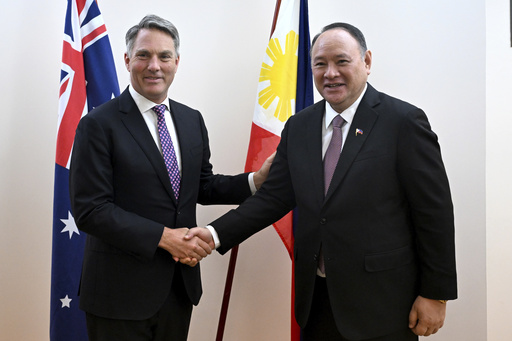
MELBOURNE, Australia — During a news briefing on Tuesday, Philippine Defense Secretary Gilberto Teodoro expressed his belief that the forthcoming administration of President-elect Donald Trump will not require the Philippines to increase its payments for U.S. military support. He noted that both nations are allied against the common challenge posed by China.
Teodoro’s comments came after a bilateral meeting with Australian Defense Minister Richard Marles, which aimed to strengthen security cooperation between the involved countries. When asked if he thought Trump would expect the Philippines, similar to Taiwan, to cover costs for American defense, Teodoro replied, “I really don’t expect some sort of a statement from Mr. Trump, hopefully not.”
He further stated, “I don’t have any preconditions or assumptions regarding the outcomes of this administration, aside from our focus on nurturing institutional ties.” Teodoro highlighted the mutual interests of both the United States and the Philippines in maintaining their partnership, which he attributed largely to the shared worries regarding China’s aggressive actions and illegal endeavors.
Australian Defense Minister Marles expressed confidence that, irrespective of the upcoming U.S. election results, the alliance between Australia and the United States would remain strong. “The election of President Trump indicates that his administration will uphold America’s leadership role globally, an essential component in preserving the international rules-based order, which aligns with Australia’s national interests,” Marles added.
In a recent development, Philippine President Ferdinand Marcos Jr. enacted two laws that reaffirm the nation’s maritime boundaries and its rights to resources, including those in the contentious South China Sea. This move provoked a strong reaction from China, which claims most of the disputed area.
The Chinese Foreign Ministry responded by summoning the Philippine ambassador to lodge a formal protest, denouncing the legislation as an effort to reinforce what they described as an illegal ruling from the South China Sea arbitration case through domestic law.
Since last year, there has been a notable increase in confrontations between Chinese and Philippine naval and coast guard vessels in the disputed waters, raising concerns that the United States, as Manila’s longstanding treaty ally, might find itself entangled in a potential major conflict.
The newly enacted laws, known as the Philippine Maritime Zones Act and the Philippine Archipelagic Sea Lanes Act, were signed by Marcos during a national broadcast attended by prominent military and national security officials. These laws bolster Manila’s rejection of China’s extensive claims over the sea passage and introduce penalties, including imprisonment and hefty fines, for those who violate these new regulations.
